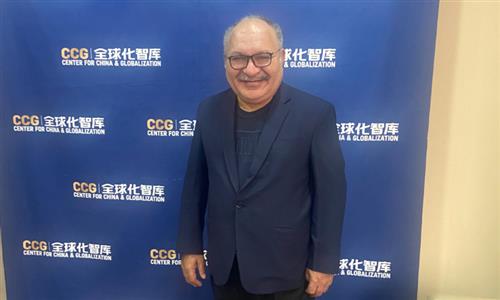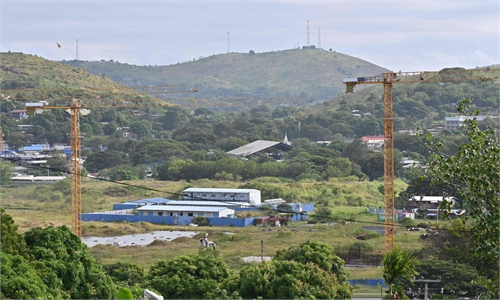IN-DEPTH / IN-DEPTH
GT investigates: US, Australia make use of political pressure, false propaganda to undermine China-South Pacific Islands cooperation
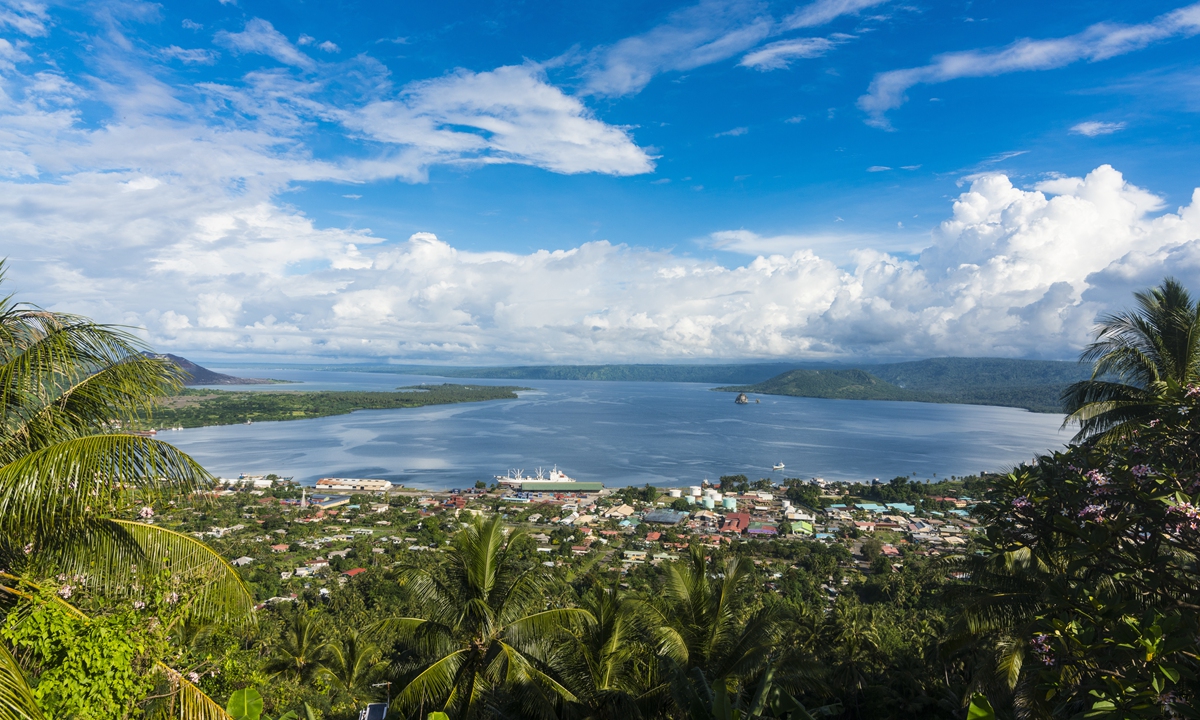
An aerial view of Papua New Guinea Photo: VCG
Shortly after the government of Papua New Guinea (PNG) announced that it was considering a potential security agreement with China, the US and Australia initiated a campaign to undermine this cooperation - the latest move in a series of ongoing efforts by the US and Australia to disrupt the partnership between China and South Pacific Island countries (PICs), experts said.
This vividly reflects US and Australian fears and concerns, driven by a Cold War mentality, toward China's pragmatic cooperation with countries in the South Pacific region. They still like to view PICs as their "sphere of influence" or "backyard," experts pointed out.
On January 29, 2024, Reuters reported that PNG Foreign Minister Justin Tkachenko said that the country was in early talks with China on a potential security deal. PNG was recently rocked by violent riots, posing significant security threats to people in the country, including many Chinese people doing business on the island.
However, two days after the Reuters report was published, Tkachenko had to reaffirm the country's close security ties with Australia and that the two countries signed a new security pact. On Monday, in an interview with the Sydney Morning Herald, US Deputy Secretary of State Richard Verma further pressed PNG to turn down China's offer of a potential security pact.
"We've seen that the Chinese commitment to defense or investment comes with a high cost. That's what we'd say to PNG," Verma claimed in the interview.
Yet, what Verma said to the media does not hold water.
"After witnessing the close and fruitful cooperation between China and South Pacific Island countries in recent years, the US and Australia have stepped up their efforts to undermine the cooperation. The move [to obstruct the China-PNG security cooperation] is just another example," Yang Honglian, a Fiji-based senior researcher with the Pacific Islands Research Center at Liaocheng University in Shandong, told the Global Times.
"These actions to disrupt normal cooperation between China and South Pacific Island countries manifest in various domains, including asserting diplomatic pressure, using economic aid competitions, and spreading false information or disinformation to smear China," Yang said.
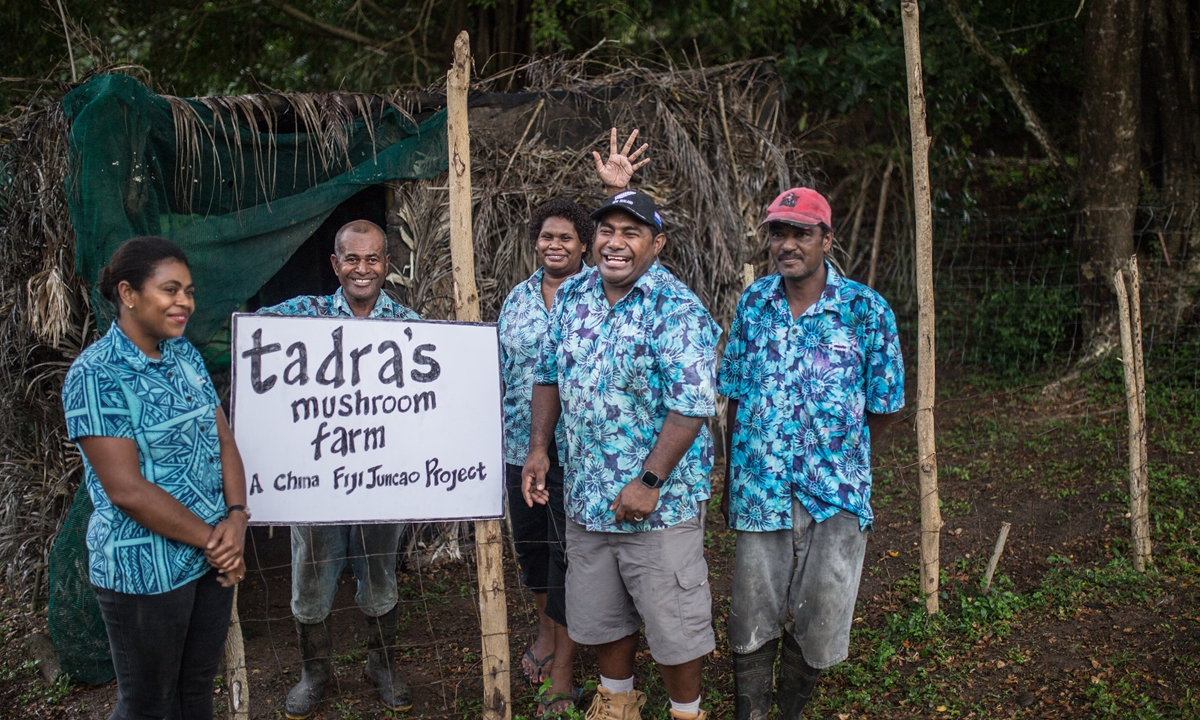
Local employees pose for a group photo at the Tadra's Mushroom Farm in Nadi, Fiji, on August 17, 2023. The farm cultivates mushrooms with China-aided Juncao technology. Photo: Shan Jie/GT
Stained records of US, AustraliaIf PNG's size as the largest one among South Pacific Island countries and its important geopolitical position are taken into consideration, its cooperation with China would undoubtedly be perceived as a "thorn in the side" by the US and Australia who don't pay any attention to the real benefits gained by South Pacific countries from cooperating with China, experts said.
In terms of the security cooperation between China and the PICs, as currently seen in the Solomon Islands and Fiji, they have significantly improved local police capabilities and crisis management. Notably, Fiji has achieved major successes in narcotics control following police training in China, showcasing the benefits of such cooperation, Yang said.
In addition to targeting the security cooperation, the US and Australia also like to smear cooperation under the framework of the China-proposed Belt and Road Initiative (BRI) by accusing China of creating a so-called debt trap while in reality, most of the PICs' debt is largely held by Western countries.
A search on Western media outlets for China's cooperation with the PICs yielded numerous results, which mostly made false accusations against the China-aided projects. However, in the current media landscape with regard to the region, the Western media machine maintains an unshakeable position. "The media is a useful weapon for them to employ," Yang said.
Furthermore, in early 2023, when rumors surfaced about China Mobile's intention to acquire Digicel, a key telecommunications company in several PICs such as Fiji and Papua New Guinea, the Australian government swiftly intervened, injecting funds into Australia's Telstra enabling it to successfully acquire Digicel in order to "block China influence," according to a Nikkei Asia report.
Despite claims from the US and Australia in recent years that they would not pressure the PICs regarding their diplomatic relations, they expressed "disappointment" after Nauru's recent decision of restoring diplomatic relations with China. China and Nauru signed a joint communique in Beijing on January 24, 2024, on the resumption of diplomatic relations at the ambassadorial level.
However, as tensions between China and the US escalate, the US government is ramping up its public support for the island of Taiwan. In September 2019, Washington expressed opposition to the Solomon Islands and Kiribati shifting their diplomatic recognition to Beijing. In November of that year, the first joint business delegation of the US and the island of Taiwan visited Saint Lucia, a Caribbean partner of Taiwan.
"In fact, they like to use direct political intervention, which is one of the most common strategies," Yang said.
A prime example of such intervention is the Regional Assistance Mission to Solomon Islands (RAMSI), led by Australia, which was aimed to prevent the collapse of the Solomon Islands government over a 14-year period, as well as the establishment of the Solomons International Assistance Force (SIAF) led by Australia in 2021. Under the so-called banner of offering aid, these organizations were meant to influence the decisions that the Solomon Islands government would make, according to Yang.
The US and Australia even take advantage of political loopholes in the island nations' elections to suppress governments that are willing to conduct cooperation with China and to support anti-China politicians, experts said.
With several PICs, including the Solomon Islands, facing elections in 2024, it is not ruled out that Australia and the US will seek to make troubles in these countries' relations with China, experts warned.
Strategic anxiety
The trend of interference is gradually intensifying as Western countries have come to realize that China's growing influence provides new options to the PICs facing difficulties. These options have forced the US and Australia to increase their aid and financial expenditure, and to invest more effort in the region, which has long been neglected by the US and Australia in the past.
Whether it is China's projects, security cooperation, or establishing diplomatic relations with Nauru, they have all been seen as "direct threats" to the so-called security interests of the US and Australia. However, the US and Australia have fallen into a self-generated "strategic anxiety" toward China, and have excessively militarized the PICs, experts pointed out.
For example, the US has signed the Compacts of Free Association with the Federated States of Micronesia, Palau, and the Marshall Islands, providing long-term economic assistance to the three countries in exchange for military deployment, military exercises, and weapons testing. The US seeks to use these countries as pawns to contain China beyond the "first island chain," and even militarize countries like Palau.
John Queripel, an Australian historian and author, told the Global Times in an exclusive interview that apart from Australia, the US also simply regards the PICs as "belonging" to them.
"Chinese interests in the Solomon Islands, Vanuatu, Kiribati, and Papua New Guinea, among others, have suddenly spurred a renewal of interests from both Australia and the US, who previously had left the region as a backwater for years," he said.
"The connections which the Solomon Islands in particular developed with China almost caused an apoplectic fit in Australia. Much of it was paternalistic, alleging that the 'naive' Solomon Islanders were being 'manipulated' by China. That type of attitude is precisely the problem that Australia has had with the Pacific," Queripel said.
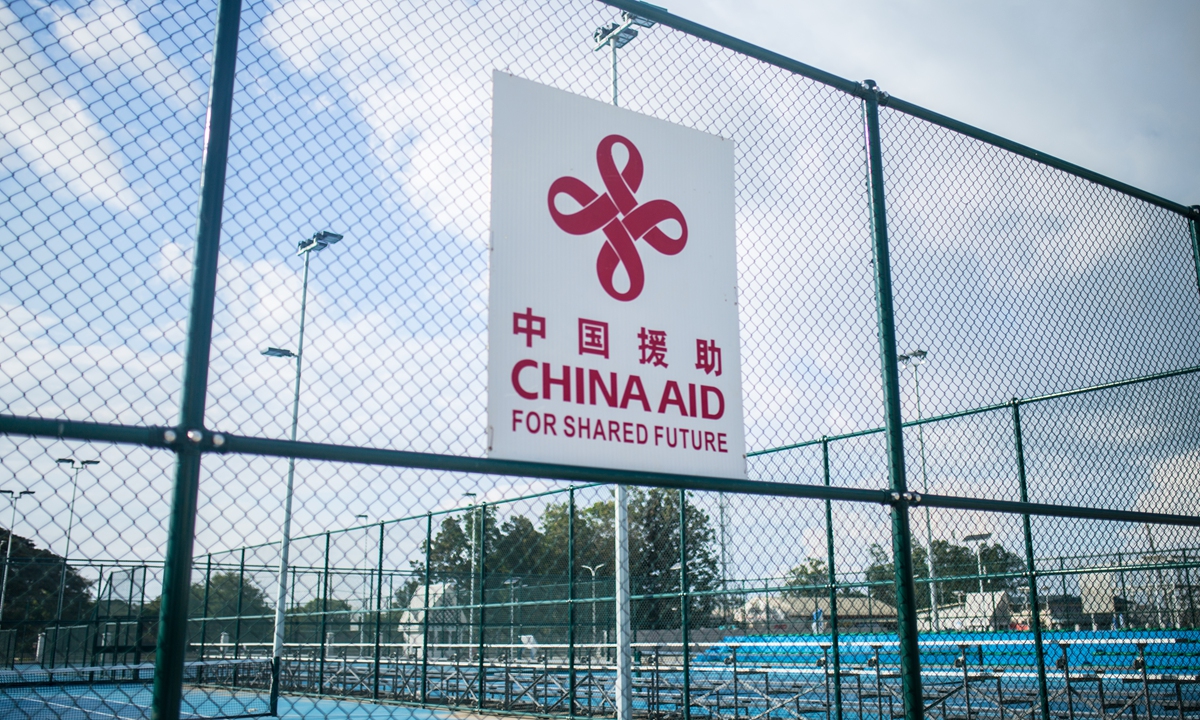
A China Aid sign is seen at a stadium constructed by Chinese construction companies in Honiara, Solomon Islands, on August 21, 2023. Photo: Shan Jie/GT
Reciprocal cooperation with ChinaChina and the PICs have enjoyed long-lasting friendly exchanges. Since the establishment of diplomatic ties in the 1970s, China and the PICs have continued to expand exchanges and cooperation in more than 20 areas, including trade, investment, ocean affairs, environmental protection, disaster prevention and mitigation, poverty alleviation, healthcare, education, tourism, culture, and sports, and all at the sub-national level, according to China's Foreign Ministry.
For the PICs, China has provided economic and technical assistance with no political strings attached, implemented more than 100 aid projects, delivered more than 200 batches of in-kind assistance, and trained about 10,000 talents in various fields. China has dispatched 600 medical professionals to the region, benefiting more than 260,000 local residents, said China's Foreign Ministry.
For countries like the Solomon Islands and other similar PICs, it would be "very stupid" not to increase cooperation with China and seize the development opportunities it offers, Solomon Islands Prime Minister Manasseh Sogavare told the Global Times while visiting China in July 2023.
"China is our good friend, and it can help us achieve these development goals," Sogavare concluded.
Queripel told the Global Times that China is setting in place a win-win model through the BRI, the BRICS, and the Shanghai Cooperation Organisation. However, the model is inconceivable in the eyes of some Western politicians and media outlets.
"The Western economic model has been, [and] still is, based on sucking up profits from around the world, impoverishing nations by taking those profits and materials back to the colonial powers… China itself knows that well from its 'century of humiliation,'" Queripel said.
Yang noted that the PICs are increasingly advocating for non-aligned and independent foreign policies, avoiding exclusive alignment with either Western powers or China to protect their sovereignty and agency.
"This cautious stance reflects a desire to prevent their region from becoming a geopolitical battleground, prioritizing national control and economic security over military alliances," he said.
In response, both Western countries and China should engage with these countries on equal footing, respecting their autonomy and right to development. Strengthening cultural, educational, and people-to-people ties can foster mutual understanding and support the creation of sustainable, long-term relationships that benefit all parties involved, Yang noted.
